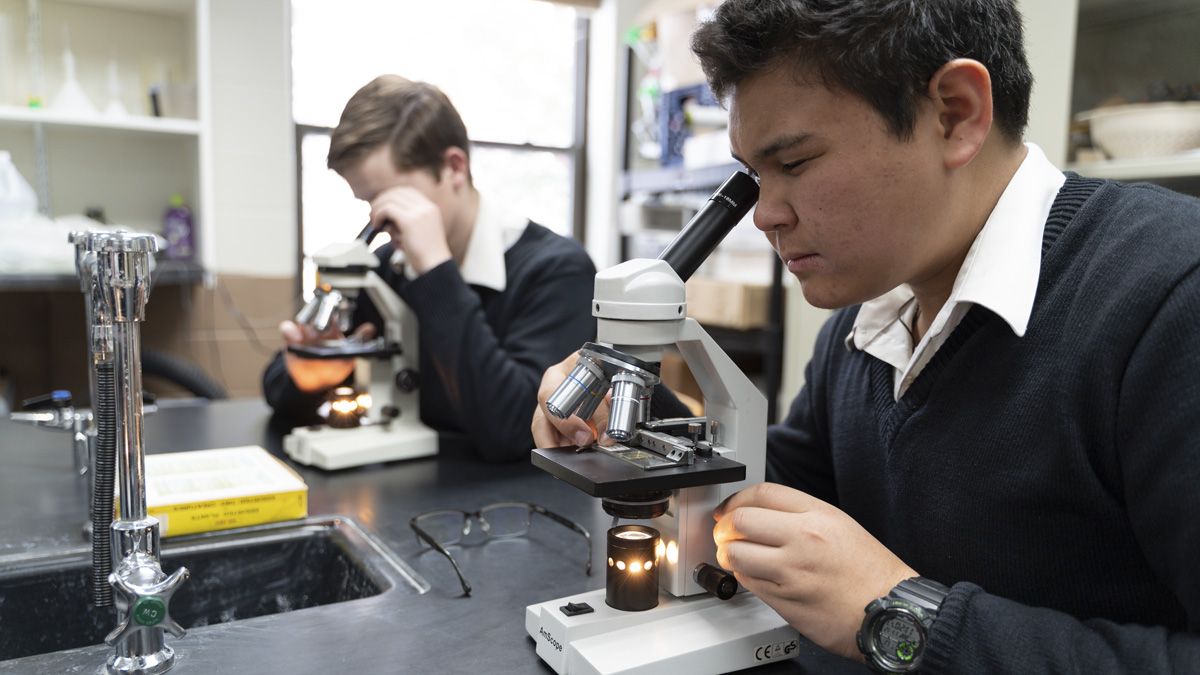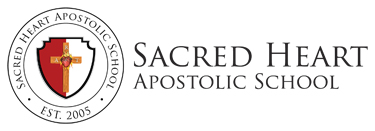
English
Grammar: A quick review of basic grammar takes place at the beginning of the year, with reinforcement given as needed throughout the course of the year.
Vocabulary: Each week spelling, definition, and proper usage of twenty words are learned using Sadlier-Oxford’s Vocabulary Workshop, levels E and F.
Literature: The students study different genres of literature, review the basic literary terms and structures learned in the previous year, and learn to analyze and compare character and theme. Every three weeks, the students memorize and recite at least one poem. There is a close reading of Shakespeare’s Julius Caesar, followed by a performance of an abridged version of the play before the whole student body.
Composition: The emphasis is on learning to write well-constructed essays and to give extended coherent answers of up to one half page to questions related to the literature under study. The boys study and write narrative, persuasive, descriptive, and expository compositions, and even a bit of fiction.
Advanced Algebra
This course initially considers more advanced applications of topics covered in Algebra, so that students are confirmed in the basic skills of manipulating known and unknown quantities. Field properties and algebraic proof are studied. Real and complex numbers are developed using the vector model. Operations and closure are considered. Students then survey the various classes of functions that are considered in later courses. These include linear, polynomial, rational, quadratic, exponential, and logarithmic functions.
Biology I
This course will provide a basic overview of fundamental life processes, interactions among organisms, and appreciation of how scientists work. Six major themes will be investigated: Unity within Diversity; Evolution (as it relates to unity and diversity among organisms); Energy; Homeostasis; Systems and Interactions; and The Nature of Science. Students will study the fundamental aspects of cellular biology, the biochemical basis of life and will investigate the transfer of energy from the sun through living systems. In biology, students will develop an understanding of the principles and mechanisms of genetics and analyze important concepts of natural selection as they relate to diversity of life. The study of biology will include the study of ecology to include the exploration of interdependence and interactions of organisms within an ecosystem.
World History II
The course covers the history of Western Civilization from the fourth century up until the close of the nineteenth century. Topics covered include the fall of the Roman Empire, the long endurance of the Byzantine Empire, the rise of Islam, the Early Middle Ages, the High Middle Ages, the Renaissance, the Protestant Revolution, the Enlightenment and the Industrial Revolution. Important historical documents are studied.
Latin
Students begin with a quick review of the morphology and basic syntax learned in previous courses, and then begin delving into the more complex Latin syntax in which they study the various uses of the subjunctive mood. The text for this course is Jenney’s Second Year Latin, which follows the same methodology as the first year text with forms, syntax explanations, vocabulary, exercises, and a story. By the end of the year, students should be thoroughly familiar with all Latin grammar and be ready to translate the works of the great Latin authors.
Religion
The class studies Christian morality using the text Our Moral Life in Christ by Aurelio Fernandez and James Socias and the third part of the Catechism of the Catholic Church, as well as a chapter from The Spiritual Life by Adolph Tanquerey. Topics include freedom, the passions, conscience, law, the moral act, sin and conversion, and each of the Ten Commandments. Memorization of important definitions is coupled with an understanding of the philosophical and theological principles underpinning moral theology. Students are taught the true meaning of freedom in connection with objective truth; what the passions are and how to deal with them; the role of the conscience in recognizing and acknowledging divine law; common errors in judging the morality of actions; the principle of double effect; sin as personal and social; original sin; the social teaching of the Church; and the demands that each of the commandments makes on Christians in their quest for holiness.
Art
This course meets twice per week. One class per week is dedicated to a study of art history. Students are introduced to the various styles of art as it has existed over the centuries, beginning with the cave paintings in Lascaux and concluding with modern art of the twenty-first century. Our study includes examinations of the world’s masterpieces as well as biographical information of the great artists. The second class each week is dedicated to a hands-on approach to art where students can explore their creativity with a variety of mediums including drawing, painting with tempura and watercolors, pastels, origami, and clay.
Physical Education
Daily physical education is an essential part of the Sacred Heart Apostolic School program. We believe that sports provide not only the physical and mental rest necessary for the student’s balanced growth but also the opportunity to form character and virtue and to thoroughly enjoy one’s growing abilities. At least one hour a day is allotted for intramural soccer, basketball, hockey, football, volleyball, and other sports.
On alternating Saturdays, the students have a chance to enjoy nature off campus at local parks or work on the grounds around the campus.
Music
The students begin their year-round study of classical music in the Summer Course. They begin with an introduction to the instruments of the orchestra and some musical forms. The course is cyclic and over a three-year span covers the Middles Ages, Renaissance, the Baroque Period, the Classical Period, and the Romantic Period. Audiovisual presentations are the prime medium used to familiarize the students with the music as well as to cultivate an appreciation for the various styles.

